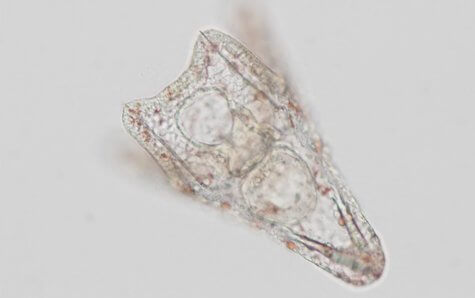TSUKUBA, Japan — Do you often “think with your stomach”? A recent study finds that may be all about evolution. Researchers from the University of Tsukuba say many living organisms, such as the sea urchin, use light as a biological indicator because they lack a visual system. They discovered that sea urchins utilize light to control the opening and shutting of the pylorus, an essential component of the digestive system, leading them to speculate that neural cells may have evolved to control digestion based on light input.
Systems that are dependent on light are also usually dependent on the function of proteins from the Opsin family, which are present in animals with and without visual systems. Identifying the role of Opsins in various species that use light as an external signal may give crucial insights into how visual/non-visual systems emerged in living organisms. The role of Opsins in the Ambulacraria animal group to which sea urchins belong is still unclear.
“The functions of eyes and visual systems have been well-characterized,” says Professor Shunsuke Yaguchi, senior author of the study, in a university release. “However, the way in which light dependent systems were acquired and diversified throughout evolution is unclear especially in deuterostomes because of the lack of data regarding the signaling pathway in the Ambulacraria group.”
Uncovering the brain’s first job

Researchers set out to determine this by analyzing the effect of light exposure on the activity of sea urchins’ digestive tracts. Next, they used microsurgical techniques to suppress genes related to Opsin in order to test if Opsin cells in the digestive tract of the sea urchins could control the impact of light.
“The results provided new information about the role of Opsins in sea urchins,” explains Prof. Yaguchi. “Specifically, we found that stimulation of sea urchin larvae via light caused changes in digestive system function, even in the absence of food stimuli.”
Additionally, near the cells that express Opsin, researchers discovered neurons controlled by serotonin which regulate the light-stimulated production of the neurotransmitter, nitric oxide.
“Our results have important implications for understanding the process of evolution, specifically, that of light-dependent systems controlled via neurotransmitters,” says Professor Yaguchi.
The findings suggest that one of the first functions of brain neurons in our evolutionary predecessors was to regulate the digestive tract. Since the ingestion of food and absorption of nutrients are essential for life, the creation of a complex brain-gut regulation system may have been a significant stride forward in the evolution of animals.
This study appears in the journal BMC Biology.
